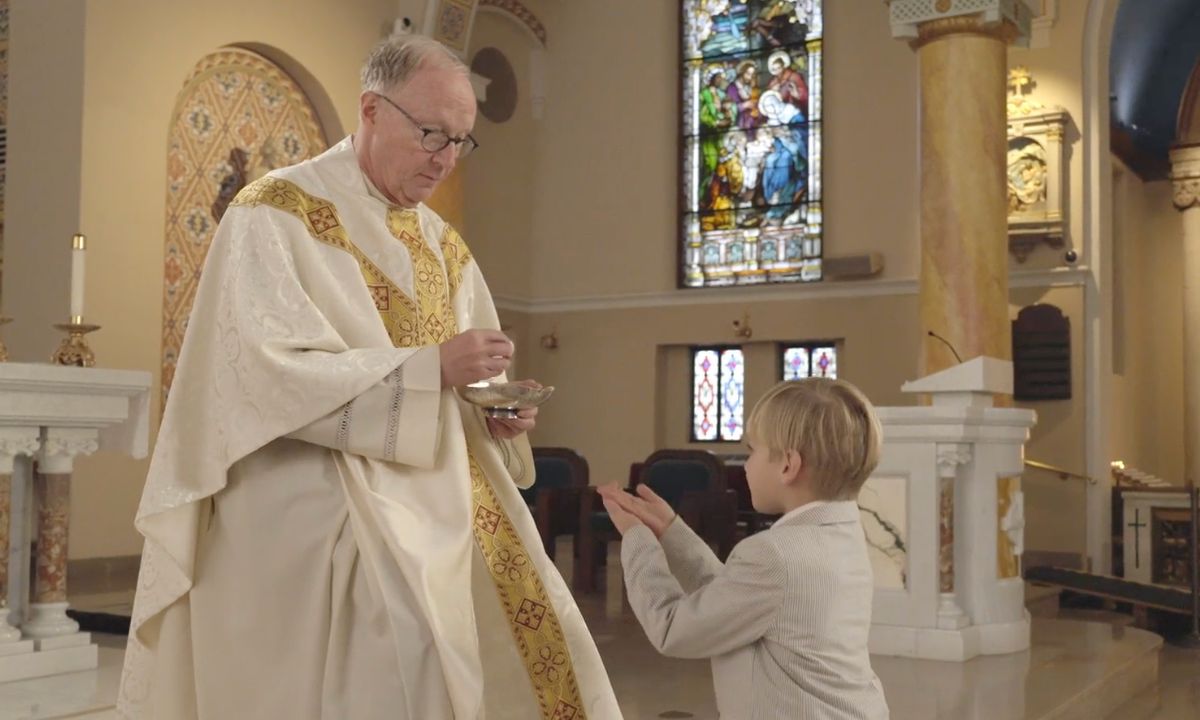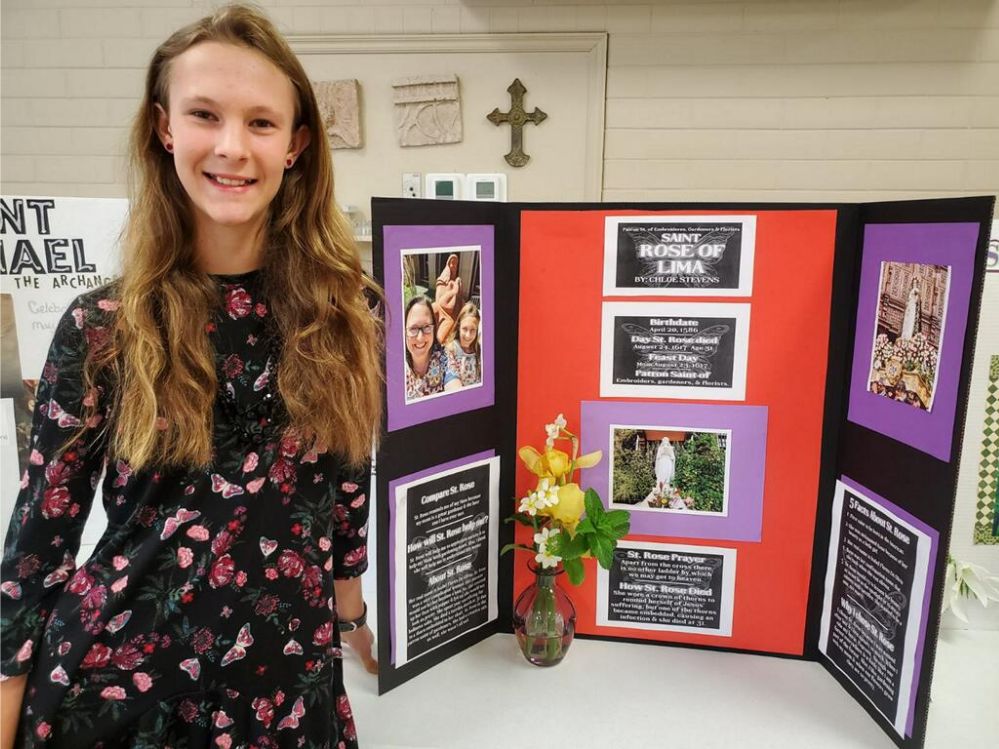‘Up in the Air’: Oklahoma Families in Limbo as Courts Decide on Religious Charter
Funds will start flowing to St. Isidore in August unless courts say it violates laws on church-state separation.

Get stories like this delivered straight to your inbox. Sign up for The 74 Newsletter
At the nation’s first religious charter school — an Oklahoma virtual K-12 named for the patron saint of the internet — student registration and staff recruitment are in full swing for an August opening.
“If you love the Lord and you are excited about teaching … we would love to talk to you,” Misty Smith, principal of St. Isidore of Seville Catholic Virtual School, says in a video to prospective educators.
But with the school’s future still tied up in court, and legal disputes likely to continue, it’s unclear whether taxpayers will be picking up the cost this fall. Church leaders are having an “ongoing conversation” about whether to launch the online program as a private school if a court blocks it from receiving state funds, said Brett Farley, executive director of the Catholic Conference of Oklahoma, a public policy organization.
Opponents argue that the charter, approved a year ago by a state board, violates both Oklahoma and federal laws against the government funding of religion. As the principal said in another video, the school plans to provide education through “a Catholic lens.” With rulings in two separate cases against the school pending, however, families are still stuck in limbo. Of the 218 applications the school received as of last week, over 160 have enrolled and another 35 are deciding whether to accept a seat in the school’s inaugural class.
“There are so many things up in the air,” said Joy Stevens, whose daughter Chloe secured a spot through the application lottery. As a contingency plan, Stevens registered her daughter in the Velma-Alma public schools, near their small farm south of Oklahoma City. “I don’t know if we can afford private.”
The state Supreme Court has yet to rule on a lawsuit by Oklahoma Attorney General Gentner Drummond it heard in April. It’s unclear whether that decision will come down before state funds are set to be distributed to the school in August — an estimated $1.2 million, according to the virtual charter school board that approved the application.
In the second case, an Oklahoma County district court on July 24 will hear from a coalition of parents and advocates seeking an injunction to block the school from opening and receiving those funds. They argue that the school will discriminate against LGBTQ students and those with disabilities as well as families and staff who don’t follow Catholic teachings.
They celebrated last week when the judge in the case ruled their lawsuit can move forward.
Judge Richard Ogden denied most of the claims made by defendants who wanted him to dismiss the case. The defendants, including Republican state Superintendent Ryan Walters and the state board of education, assert that the school has promised not to discriminate.
They argue that the school doesn’t violate laws against the government establishing a religion because St. Isidore is a private organization that will exist with or without the charter. In addition, parents don’t have to enroll their children.
“No student is required to attend St. Isidore or adopt its beliefs,” they wrote in their motion. “St. Isidore is thus not forcing anyone to ‘submit’ to religious instruction or conditioning education on any ‘religious test.’”
‘A slippery slope’
The state, however, wants to make sure that all public school students receive religious instruction during the school day if their parents wish, as long as they’re not missing core classes. Gov. Kevin Stitt last week signed a law clarifying that districts can allow students to take up to three religious-related classes each week — and receive elective credit.
Ohio-based Christian nonprofit Lifewise Academy, for example, provides “evangelical Bible education” and lobbied in favor of the Oklahoma law. The organization will expand to offer classes in 23 states this fall, but some opponents say allowing students to leave school during the day is disruptive and puts them further behind academically.
Walters, however, quickly warned the Satanic Temple, which plans to make its Hellion Academy of Independent Learning available to students, that it is not welcome. In 2019, the IRS granted the temple tax-exempt status, just like other churches. But Walters doesn’t consider satanism a religion.
“I know that you guys like lying, and that’s the central part of your belief system,” Walters addressed the organization in a video on X. “But you will not be participating with our schools.”
Interest from the Satanic Temple shouldn’t necessarily come as a surprise to Walters or Stitt. Drummond predicted that state leaders would open the door to non-Christian organizations if they pushed for more religious freedom in public schools.
In an opinion last year, he said a religious charter could “create a slippery slope” and obligate the state to spend public dollars on charter schools “whose tenets are diametrically opposed” to the beliefs of many Oklahomans.
St. Isidore, meanwhile, is preparing to open and is “ordering what is needed for students and staff to be successful,” said Lara Schuler, senior director of Catholic education for the Archdiocese of Oklahoma City, which applied for the charter along with the Diocese of Tulsa.
Teacher contracts won’t start until Aug. 1, and according to the school’s website, leaders are still looking for a fourth grade teacher and high school math, physics and chemistry teachers. At this point, the school is still well under its first-year capacity of 500 students.
Stevens said she’s been in touch with staff to ask how her daughter can meet other incoming students and “study partners” over the summer. The school is planning two “all-school masses” during the year, according to its parent handbook, and will form local parish hubs for additional worship and in-person gatherings, like field trips, for students.
Stevens said Chloe, who has been attending public school, is worried about whether St. Isidore will be academically tougher than what she’s used to.

“Her only concern has been how rigorous the education looks. She’s worried she’s not going to be third in her class or second in her class,” Stevens said.
Some involved in the litigation, however, think the school should delay its opening until the legal matters are settled.
“I think it’s unsettling to enroll and start students in a school, which is under court review — just seems impractical,” said Robert Franklin, chair of the Oklahoma Virtual Charter School Board. Though a defendant in the case before the state Supreme Court because of his position, he voted against the charter application. “Using students and families as chess board pieces seems unnecessary.”
Get stories like these delivered straight to your inbox. Sign up for The 74 Newsletter

;)
